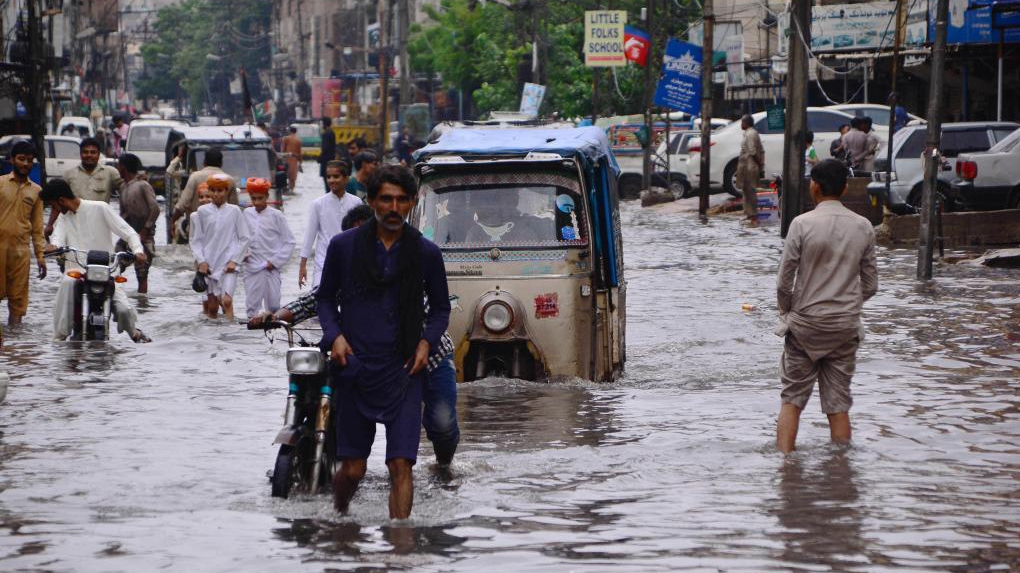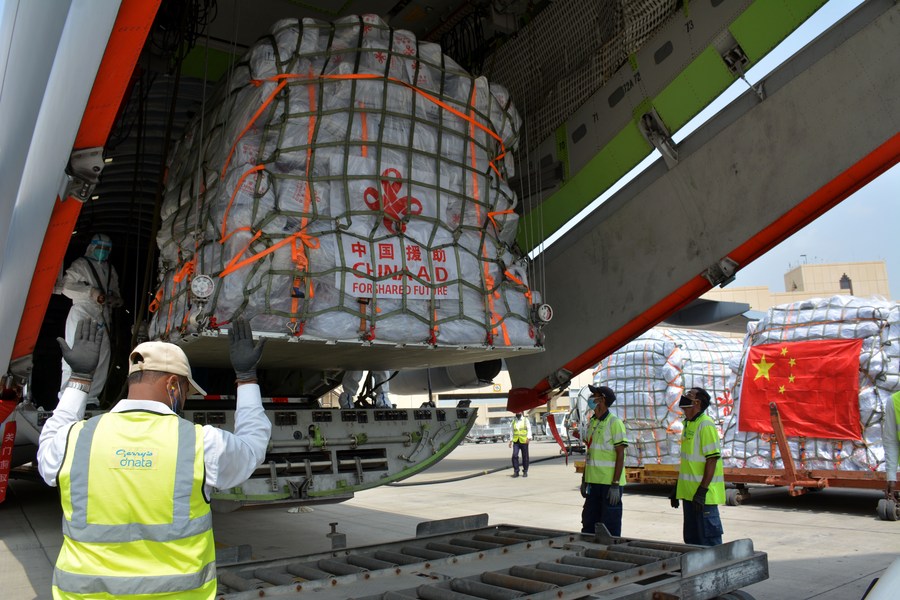
People wade through flood water after heavy rains in southern Pakistan's Hyderabad, August 23, 2022. [Photo/Xinhua]
By Ruqiya Anwar
UN Secretary-General Antonio Guterres, on September 10, visited several areas of Pakistan which is facing the worst flooding of this century due to prolonged, heavy monsoon rains that began in June 2022, with rivers spilling their banks, severe storms, and bursting glacial lakes.
As a result, over a million people have been left homeless, and nearly 1,400 people have died due to floods in Pakistan, which have swamped roughly one-third of the country and devastated crops in a state grappling with rising prices and an imbalance of payments crisis. Guterres indicated that he had "never seen climate carnage" on this scale, after reviewing the situation in flood-stricken Pakistan.
Numerous public health institutions, water infrastructure, and schools have been destroyed or damaged, in addition to hundreds of thousands of residences. As of September 9, more than 6.4 million people are in dire need of humanitarian aid; many lack access to sanitary facilities, food, or adequate housing.
Unfortunately, the main problems remain the same despite all this massive destruction. Pakistan regularly endures a monsoon season and is no stranger to natural disasters like floods, earthquakes, or other calamities. Why has Pakistan not made enough investments in infrastructure that is climate resilient? Why does the government lack emergency preparedness?
The truth falls halfway between poor management and climate change. The current crisis in Pakistan is a triple whammy, combining economic, political, and natural factors. The people had already suffered due to inflation, mass unemployment, and political turmoil. Now the floods have driven millions into disaster.
To cope with natural calamities, Pakistan must also commit to changing its methods and guidelines for managing disasters and preparing for them, in addition to its policies regarding climate change. Although these measures will not be simple solutions, the Pakistani state must demonstrate a strong political will to transform the country's system.
Notably, based on its extensive experience in disaster management and its status as an all-weather friend, China offered to assist Pakistan in coping with emergencies like floods. In the wake of significant natural calamities, China has always been prepared to assist Pakistan.

Unloading relief supplies donated by China at an airport in southern Pakistani port city of Karachi, August 30, 2022. [Photo/Xinhua]
China has already mobilized resources to aid in flood relief and rehabilitation efforts, and is confident that Pakistan can meet the challenge under the leadership of its central and provincial governments and with the help of the international community.
Importantly, China is susceptible to earthquakes, floods, droughts, fires, typhoons, snow storms, and pandemics. Natural calamities strike China from time to time. In its long history, China has experienced numerous flood disasters. Internationally, China's ability to respond to crises has improved. China has innovatively used technology to deal with disasters.
The Natural Disaster Reduction Center of China (NDRCC) has a cutting-edge operations center from which various technologies, such as imagery from three orbiting satellites and unmanned drones controlled by private companies, can monitor natural disasters.
The NDRCC is a specialized organization that provides information services to support actions on various natural disasters. It collaborates with the United Nations Platform for Space-based Information for Disaster Management and Emergency Response and is a member of the United Nations Office for Disaster Risk Reduction, making its maps and satellite imagery accessible to nations worldwide.
China has expertise in coping with weather-related calamities, notably lessons learned from last year's floods in several provinces in China, and has responded to this year's harsh weather more quickly, effectively, and expertly.
Moreover, the Chinese government has attempted to establish a cutting-edge emergency management system. This includes novel laws and regional rules. The swift policy alterations needed to help these initiatives were made, including both immediate and long-term effects. The Chinese government is promoting top-down reforms to the disaster response system, more emergency management training and education, and international cooperation to exchange knowledge and experience with other countries.
To deal with the recurrent flooding, Pakistan should adopt and replicate the Chinese sponge city model, also known as green development interventions and green infrastructure in other nations, which is a new urban construction model for flood control, enhancing ecological infrastructure, and drainage channels. The model's benefits include reducing Pakistan's two persistent ailments: urban floods and a lack of water supplies.
Significantly, in minimizing flood-related damage, China has witnessed extensive accomplishments. In addition, China has made an impact by raising public awareness and enhancing infrastructure for water conservation. Floods are still a problem for the country, but the destruction is gradually improving. All of these are valuable lessons for Pakistan.
Hence, Pakistan should learn from China's modern technology and take lessons from such innovations. For example, China can assist Pakistan in developing a monitoring system to obtain rainfall statistics and river flow data to further control floods because of its extensive experience in flood control and management.
Ruqiya Anwar, a PhD scholar of Media and Communication Studies from Pakistan, is a researcher and socio-political analyst.

 中文
中文



